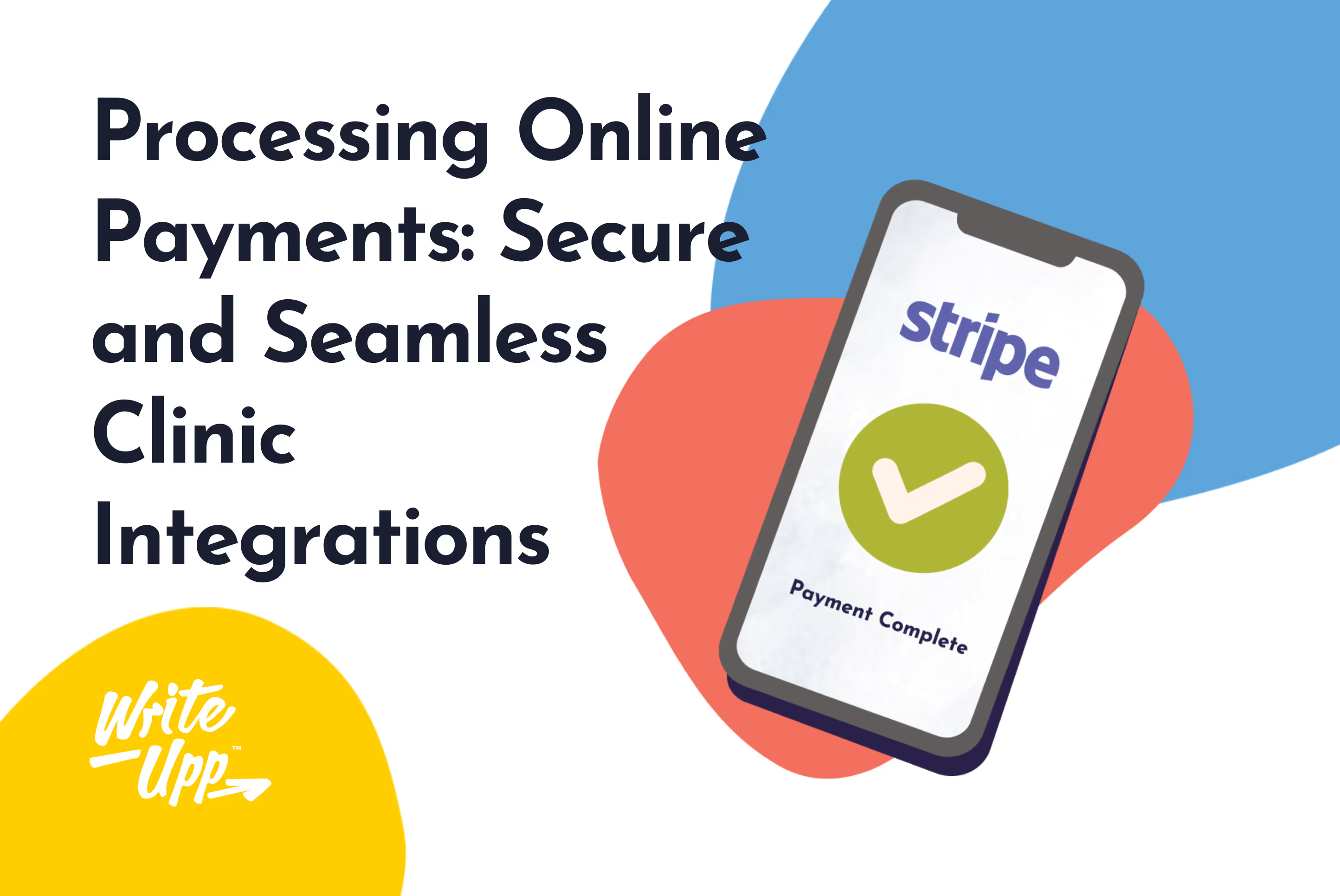In a world driven by ever-evolving marketing strategies and techniques, ethical considerations often take a backseat to the pursuit of profit and client acquisition.
However, in private practice, where the well-being and trust of clients are paramount, ethical marketing plays a crucial role in establishing a solid foundation for success.
In a recent episode of The Healthy Practice podcast from WriteUpp, we spoke with Dr Rosie Gilderthorp, a Clinical Psychologist, podcaster, writer & award-winning social entrepreneur.
Dr Rosie gives us a crash course in Ethical Marketing. It's a topic that’s ever more prevalent in online conversations, which we hope you’ll find valuable. You can listen to the whole conversation here:
https://pod.co/the-healthy-practice/ethical-marketing-in-healthcare
In this blog post, we delve into ethical marketing in private practice, exploring why it matters and how it can set you apart as a practitioner who genuinely cares about your clients' welfare.
From building trust to fostering long-lasting relationships, ethical marketing is the compass that guides your journey towards sustainable success.
What is Ethical Marketing?
Ethical marketing is the practice of promoting goods, services, and ideas that are aligned with moral principles and values. In private practice, ethical marketing can be defined as the responsible promotion of mental health services to potential clients in a way that respects their autonomy, privacy, and dignity while avoiding any harm or undue influence.
Marketing in private practice can take many forms, such as:
- Creating a business plan
- Setting up business profiles on social media platforms
- Creating marketing materials
- Running marketing campaigns
- Advertising services online
- Developing a website with authoritative content
All of these activities should be conducted ethically to uphold the professional standards of mental health services.
The UK Council for Psychotherapy (UKCP) provides guidelines for ethical marketing, highlighting the importance of informed consent, avoiding power differentials, respecting privacy and confidentiality, avoiding dual relationships, and avoiding conflicts of interest or potential harm to clients.
The Benefits of Ethical Marketing
Ethical marketing is not just about avoiding ethical violations; it can also benefit mental health professionals and their practice.
- Build a Positive Reputation
One of the significant advantages of ethical marketing in private practice is building a positive reputation.
Clients seek mental health services from providers they can trust and respect. Adhering to ethical marketing practices can create a reputation for offering high-quality, trustworthy services. This can lead to word-of-mouth referrals and positive reviews, ultimately attracting ideal clients and building a successful practice.
- Build Client Trust
Ethical marketing also helps mental health professionals maintain high trust with clients.
When marketing materials accurately represent the services offered and the benefits to clients, it establishes a sense of trust. Clients feel confident that they are receiving accurate information and can rely on the provider to deliver on the promises made in the marketing materials.
- Attract Your Ideal Clients
Marketing that aligns with ethical codes can also bring in ideal clients looking for services that align with their values.
For example, if a mental health professional uses marketing campaigns that showcase their commitment to diversity and inclusivity, they may attract clients who value those qualities in a provider. This can help build a client base of individuals who are a good fit for the practice and can contribute to a positive therapeutic outcome.
- Avoid Potential Harm to Clients
Finally, ethical marketing can help mental health professionals avoid ethical dilemmas and potential client harm.
By ensuring that all marketing activities, including social media posts and online advertising, are conducted professionally and ethically, mental health professionals can avoid undue influence over clients and prevent conflicts of interest.
Client Considerations
Your marketing activities reflect your commitment to ethical standards and prioritise the well-being of everyone who comes into contact with your practice.
It's essential to ensure that all marketing efforts are conducted in a way that does not harm or exploit your current clients. This includes obtaining informed consent before using client testimonials, avoiding any dual relationships that could create ethical conflicts, and being mindful of what information is shared on social media or online review platforms.
Mental health professionals should also be cautious not to disclose confidential client information. Strike a balance between marketing your services without disclosing personal information or details about a client's mental health condition.
Ethical marketing involves being transparent and honest about the services you offer and any limitations. This can include clearly communicating any requirements for potential clients, such as whether the practice accepts insurance and being upfront about any fees or costs associated with your services.
In all marketing activities, you should prioritise the well-being and safety of clients. This includes being mindful of any power dynamics in a therapeutic relationship and avoiding unethical tactics or manipulations that could harm individuals seeking mental health services.
Code of Ethics
Mental health professionals are guided by a Code of Ethics established by their governing board or association to ensure that all marketing efforts are conducted ethically.
The primary purpose of a Code of Ethics is to guide mental health professionals on how to conduct themselves in a manner that promotes the well-being and safety of their clients. This includes guidelines on how to advertise and market their services in a way that is ethical and responsible.
For example, it may require that all marketing materials, including social media posts, advertisements, and websites, be accurate, truthful, and not misleading and that mental health professionals gain informed consent from their clients before using any testimonials or photos in their marketing campaigns.
Another essential aspect of the Code of Ethics is confidentiality. Mental health professionals must ensure that their marketing materials do not reveal confidential client information without explicit and informed consent.
Undue Influence
Undue influence is when mental health professional uses their power to exert pressure or influence over their clients. This can happen in various ways, including through marketing and advertising.
One way to avoid undue influence in marketing and advertising is to provide accurate and informative materials that allow potential clients to decide whether to use the mental health professional's services. This could include providing helpful advice on mental health issues, information on your training and expertise, and outlining the steps involved in the therapeutic process.
Another way to avoid undue influence is to ensure that marketing materials are not manipulative or designed to prey upon the insecurities of prospective clients. You mustn’t create an environment of fear or desperation in your marketing campaigns that could lead clients to make hasty or misguided decisions.
It is also vital to maintain clear boundaries with your clients and to avoid any actions that could be viewed as coercive. If you are exerting pressure on a client to continue treatment or to use additional services, this could be seen as undue influence and create ethical dilemmas.
Attracting Potential Clients Ethically
Identifying and understanding your target audience or ideal clients is crucial when marketing a private practice. After all, your marketing efforts should focus on reaching and connecting with individuals most likely to benefit from your services.
Your target audience may vary depending on your area of expertise and the services you provide. To identify your ideal clients, it can be helpful to consider factors such as age, gender, career, location, and specific mental health concerns.
Consider the preferences and values of your target audience, such as their preferred communication style or potential barriers to seeking mental health services.
Once you have identified your target audience or ideal clients, you can tailor your marketing materials and campaigns to appeal to them.
For example, if your ideal clients are active social media users, you may want to focus your marketing efforts on social media platforms. Alternatively, if your target audience is more likely to find you through search engines, you can invest in Google ads or search engine optimisation (SEO) to improve your online visibility.
Another critical aspect of marketing to prospective clients is creating authoritative content. Whether you are writing blog posts, social media updates, or other types of content, it's important to provide helpful advice and information that speaks to the needs and concerns of your target audience. By establishing yourself as an expert in your field, you can cultivate a reputation as a trusted provider of mental health services.
Ultimately, the key to attracting prospective clients and potential customers is to focus on providing high-quality, compassionate care that meets the needs of your target audience. By identifying your ideal customers, developing an effective marketing strategy, and operating within ethical codes, you can build a thriving private practice and make a meaningful difference in your client's lives.
Looking After Current Clients
A successful private practice focuses on attracting potential clients and maintaining a positive relationship with current clients. Your existing clients are the backbone of your practice, providing steady business and often referring others to you by word-of-mouth.
One effective way to maintain a positive relationship with current clients is by providing regular communication and check-ins. This can take the form of phone or email correspondence and in-person meetings during sessions.
Through these interactions, you can gauge your client's satisfaction with therapy, address any concerns or issues, and show clients that you care about their well-being. This attentive service can go a long way in ensuring clients remain loyal to you as a therapist and your practice.
You can also provide value to your current clients through ongoing education and resources. This can include providing informational handouts, suggesting relevant books or healthcare podcasts, or hosting workshops or support groups.
To stay ethical, avoid any behaviour seen as taking advantage of the therapeutic relationship, such as engaging in dual relationships or accepting gifts outside of established boundaries.
By operating within ethical guidelines and prioritising the needs and well-being of clients, you can foster a strong sense of trust and loyalty among your current clients. This can lead to a robust practice with satisfied clients eager to refer others to their therapist.
The Role of Social Media in Ethical Marketing
Social media has revolutionised how businesses market themselves, and mental health professionals are no exception.
Platforms like Facebook, Twitter, and Instagram have allowed therapists and counsellors to reach a wider audience and showcase their services in a more accessible way. However, with this increased reach and exposure comes a heightened responsibility to adhere to ethical marketing practices.
Be mindful of the potential for undue influence, be careful with client testimonials and content sharing, and always adhere to ethical codes and guidelines.
Social Media Posts
It's essential to keep in mind the boundaries of the therapist-client relationship and to avoid sharing anything that could be construed as an attempt to foster a dual relationship. For example, therapists should avoid sharing personal details about themselves unrelated to their clinical practice and should avoid engaging in online discussions that are personal or intimate.
Another important consideration is the potential impact of social media posts on clients' confidentiality and privacy. You must be mindful of the potential for unauthorised access to client information.
Avoid sharing content that could identify clients or disclose confidential details about their mental health issues or treatments. Obtain explicit and informed consent from clients before sharing any information about them on social media, and ensure that clients can opt out of any online marketing activities.
Share helpful advice and resources supported by reliable sources, and consider including professional photos and bio information on your social media profiles.
Online Reviews
Online reviews have become a critical component of private practice marketing. Potential clients turn to Google, Yelp, and other review sites to learn more about mental health professionals and their services.
Positive reviews can be a powerful marketing tool, whereas negative reviews can quickly turn prospective clients away.
However, approach online reviews cautiously, as you must abide by ethical codes and professional standards when responding to reviews.
Firstly, under no circumstances should you respond to reviews in a way that could constitute undue influence on the client's therapy or therapeutic process. It's important to remember that online reviews are not a substitute for therapy, and you should never attempt to address specific clinical issues through review forums.
Another important consideration is the potential for online reviews to breach confidentiality. Avoid disclosing confidential details about a client's mental health or treatment in response to a review. Respond to reviews respectfully, professionally, and without identifying your client. For example, you could respond by thanking the reviewer for their feedback or acknowledging the reviewer's experience without disclosing confidential information.
Take a proactive approach to monitoring reviews, responding promptly and professionally to positive and negative feedback.
An Ethical Social Media Marketing Strategy
A successful social media marketing strategy requires careful planning and execution. Here are some key considerations for developing an effective social media marketing strategy for your private practice:
1. Define Your Goals: What do you hope to achieve through social media marketing? Are you looking to increase brand awareness, attract new clients, or engage with your current client base? Setting specific goals will help you develop a targeted social media strategy.
2. Identify Your Target Audience: Who is your ideal client? Understanding your target audience's demographics, interests, and behaviour on social media will allow you to tailor your content to their needs and preferences.
3. Choose Your Platforms: Not all social media platforms are equal. Depending on your goals and target audience, certain platforms may be more effective than others. For example, Facebook is a great platform for engaging with current clients, while Instagram may be better suited for attracting new clients.
4. Develop a Content Strategy: Once you've identified your goals, target audience, and chosen platforms, it's time to create a content strategy. Your content should be relevant and engaging and showcase your expertise in mental health. This can include blog posts, infographics, and videos.
5. Schedule Your Posts: Consistency is key in social media marketing. It's essential to post regularly and at strategic times. Scheduling tools like Hootsuite or Buffer can help you plan and automate your posts in advance.
6. Engage with Your Audience: Responding promptly and genuinely to comments and messages can help build trust and establish a relationship with your audience. It's also essential to monitor your brand mentions and reviews on social media and respond professionally and appropriately.
7. Measure Your Results: Evaluating your social media performance is crucial to refining and improving your strategy. Metrics like engagement, reach, and referrals can help you gauge the effectiveness of your social media efforts.
The Key Takeaways
Ethical marketing is not just a buzzword or a superficial concept; it is the foundation upon which successful and sustainable businesses are built. By adhering to ethical principles, you can establish trust, credibility, and long-lasting relationships with your clients.
Ethical marketing requires practitioners to prioritise honesty, transparency, and respect for the well-being of their clients. It means providing accurate information about their services, avoiding false claims or exaggerations, and ensuring clients are well-informed about any intervention or treatment's potential risks and benefits.
Furthermore, ethical marketing involves respecting client privacy and confidentiality, obtaining informed consent, and safeguarding sensitive information. It means using appropriate and respectful language in all marketing materials and avoiding discrimination or stigmatisation.
By engaging in ethical marketing practices, private practitioners demonstrate their commitment to the well-being of their clients and the integrity of their profession. They understand that marketing is about attracting clients and creating an environment of trust and professionalism that fosters genuine connections.
By embracing ethical marketing principles, you can build a solid reputation, establish meaningful connections with your clients, and contribute to the overall well-being of the profession.
Ultimately, ethical marketing is not just good for business; it is the right thing to do.
About Dr Rosie Gilderthorp
Dr Rosie Gilderthorp is a Clinical Psychologist registered with the Health and Care Professions Council (HCPC). She is also a Chartered British Psychological Society (BPS) member.
She also runs a diverse and exciting social enterprise, which includes a business school for other mental health professionals, The Psychology Business School.
Rosie holds a doctorate in Clinical Psychology from Canterbury Christ Church University. She has completed subsequent training in Cognitive Behavioural Therapy for trauma, Acceptance and Commitment Therapy, Compassion Focussed Therapy, EMDR (specialist trauma therapy) and mindfulness.
Rosie is qualified to provide online therapy and has worked online since 2018.
Listen to The Healthy Practice Podcast
The Healthy Practice guides you through the common problems of starting your own practice.
We aim to help you take control of other aspects of practice management – including work-life balance, marketing, finances, & more – by offering insights & tips from practitioners who have mastered the early stages of private practice.
Listen here:
https://pod.co/the-healthy-practice
Or search for The Healthy Practice wherever you get your podcasts!



Join over 50,000 clinicians that we've helped using WriteUpp
Start my free trial






